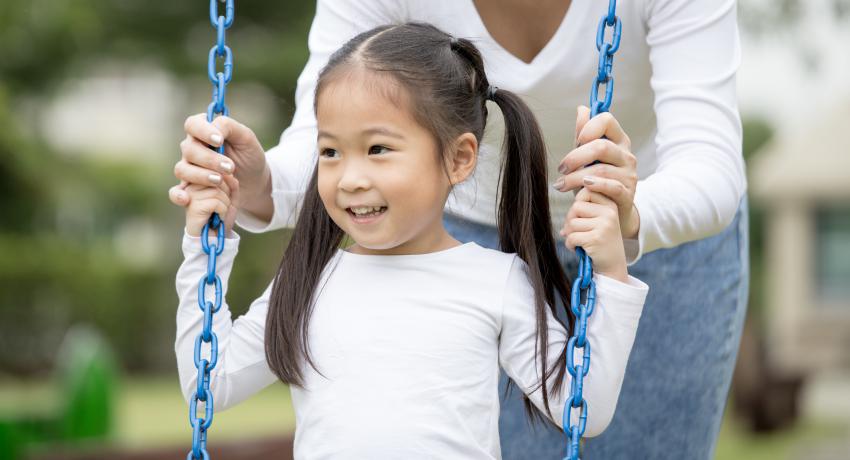“Push me! Higher!” Anyone who has visited a playground is familiar with the enthusiastic commands of young children as they enjoy a playground staple: the swings. Swings are a classic for a reason—not only are they fun, but they also play an important role in the physical, social-emotional, and even scientific development of young children.
The Department of Children, Youth, and Families recognizes the importance of swings in children’s play. Part of recognizing high quality early learning in Early Achievers is seeing a variety of active physical play, as well as quality interactions between children at play and their caring adults.
Swings are a great way to promote active physical play. As young children learn to “pump,” they use their entire bodies to control the movement of the swing. While working the arms, legs, and torso, they are stimulating a large variety of muscle groups, enhancing their coordination and the systems in their bodies that are important for balance and sensory development.
Swings also enhance children’s social-emotional growth. Children learn communication skills as they request that an adult or peer push them higher, lower, faster, or slower. They experiment and problem-solve as they learn to use their own bodies to swing. Children also learn to take turns or even share on larger swings like a tire swing.
Swings are also a novel opportunity for children to practice scientific reasoning. What happens when they shift their weight this way or that? What happens when they drag their feet on the ground? Learning to swing is experimentation and physics in action.
Similarly, supervision by and interaction with caring adults is equally as important as physical activity. Warm, encouraging involvement can take an activity like swinging from just fun to out of this world! Teachers that are actively involved in play with children not only encourage longer, more active play, but they also help with cognitive and linguistic development. Pushing a young child on a swing is an excellent opportunity for a teacher to introduce new vocabulary, pose a question that encourages a child to reason, or sing a song or chant that encourages a child to sing along. This exposure to language is incredibly beneficial.
Early Achievers encourages early learning programs to consider ways in which caring adults can help and encourage a stimulating and active childhood that honors child choice. Swings are one way to help promote a healthy and happy childhood.

